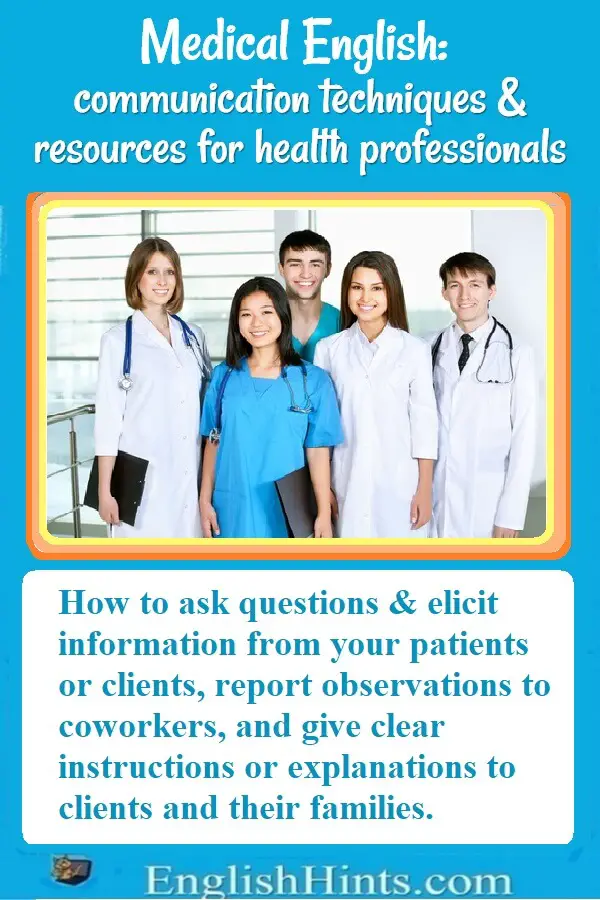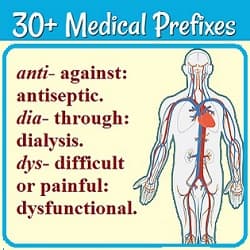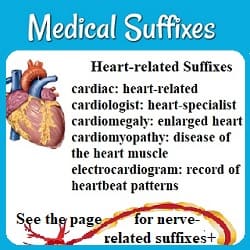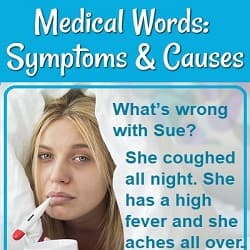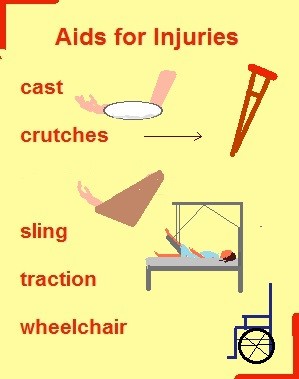Medical English for Health Professionals +
Medical English is the specialized vocabulary used by healthcare professionals and clinical researchers. This page also discusses the communication techniques needed for effective work relationships.
Medical terminology is not enough.
If you're a medical professional in an English-speaking country (or communicating with an international audience), you also need to know how to speak English with patients, coworkers, and the public.
You may also need to write in English. It's important to consider your audience. The general public needs clear, non-technical English. Professional colleagues may need more detailed, technical explanations.
When writing for an international audience, remember many may not be native English speakers. It's worth the effort to double-check what you write to keep it clear and easy to understand.
Good English communication skills are essential!
- Completely understanding patients can help you recognize problems and make diagnoses.
- Taking care that patients and coworkers understand your messages can help avoid dangerous errors.
Medical care really is a team effort!
If English is not your native language, the pages below may help you review basic communication in English:
- how to ask questions and elicit information from your patients/clients,
- how to report observations and actions to coworkers, and
- how to give clear instructions or explanations to clients and their families (and to coworkers).
Finding Info on Medical English
Find the sections on the page quickly with the links below.
See the Medical Vocabulary section for both technical and lay (non-professional) words related to health care.
See Clear Communication for Health Professionals for help with
- forming questions,
- reporting patient information, and
- giving advice or instructions.
Then check out Other Medical English Resources, and Where to Start.
Medical Vocabulary +
For basic medical terminology, see Medical Vocabulary. It discusses common disease, exam, medication, and treatment vocabulary.
The pages below are also useful if you find medical terminology confusing or if you work with patients and need to know the words they are likely to use to explain how they feel.
Learn the meanings and Greek roots of Medical Prefixes and practice them with a quiz.
Learn the English meanings of Medical Suffixes with Greek roots, then take a quiz to check your understanding.
Medical Words for the symptoms and causes of illnesses, including the slang words patients may use to describe how they feel..
Clear Communication for Health Professionals
Review Asking Questions & Giving Advice in English
- Question Formation shows the different ways to ask questions in English, using examples from healthcare settings.
- Using Helping Verbs to Give Advice and Practice Giving Advice both give example of ways to make suggestions.
The practice page also has a gap-fill exercise. It's a conversation between a discharge nurse and a patient who is preparing to leave the hospital. Choose the best helping verbs to complete the conversation. It's hands-on practice giving advice.
Review Sentence Structure & Writing in English
For a quick review before writing a report or article, see English Sentence Structure. Negative Sentences, Compound Sentences, Complex Sentences, and/or Transition Words give more specifics.
Other Medical English Resources
There are lots of resources online, including medical dictionaries and some medical terminology.
- Englishmed has thousands of animated dialogues and practice exercises. They're for doctors, nurses, pharmacists and general med staff.
- English Health Train is a wonderful resource for English classes for health professionals. They have a complete, communicative curriculum. I've taught some of it and recommend it highly. I love their well-integrated reading, listening, and speaking activities. They also have ideas for research projects.
It's designed to teach medical English communication in a class setting, where you can interact with others and a teacher can guide you. If that's not possible, you could still get great value from studying these materials on your own. You can do all the thinking, listening, reading, and writing activities by yourself. You could practice speaking and do many of the projects if you can work with a friend.
The listening exercises are especially useful. Listen to different English accents and expressions that patients or other health workers might use. Then think about how you would respond.
- Medical English Clear and Simple is an excellent book to review medical vocabulary and communication. It integrates reading, writing, listening, and speaking. It can be used as a classroom text or for individual study. Try Amazon.com or another online bookstore.
- Try watching TED or TEDMED* talks to improve your English listening comprehension and vocabulary. They're full of useful or inspiring ideas.
(Many of the TED talks are also translated into several languages. They also have written transcripts. You might watch in your first language for the main idea, and then watch and/or read in English. *There are more TEDMed talks than the few visible on that page. Click the white arrow on the right of each talk shown.)
Lots of their talks are about the practice of medicine. They raise good questions to think about while working on your English. You might start with this list of some TED popular talks by doctors.
There are more (often with related vocabulary practice) in some of our newsletter back issues, especially issues 23-24 & 31-36 (at the end of 2013 & the beginning of 2014, near the bottom of the page. This isn't new research, but the talks explain some very interesting ideas!)
Where to Start
There are several good free medical dictionaries online. They're useful if you need the meaning of a specific word, or want to know more about a specific medical procedure.
See Medical Vocabulary for an overview of English healthcare terms. If you work directly with patients, review Using Helping Verbs to Give Advice and Practice Giving Advice.
Home> Advanced Communication Skills in English > Medical English for Health Professionals.
Didn't find what you
needed? Explain what you want in the search box below.
(For example, cognates, past tense practice, or 'get along with.') Click to see the related pages on EnglishHints.
| site search by freefind | advanced |
